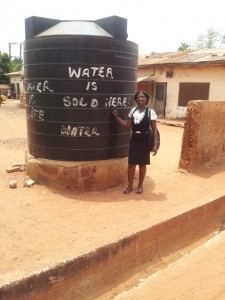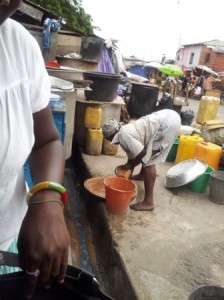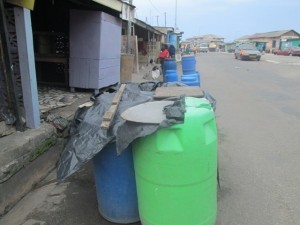I have been working in Ghana for the past two and half months on my master’s research project, which is focused on water governance and delivery in the city of Accra, Ghana. I began working from the 3rd of June under the external supervision of Prof. Jacob Songsore in the Department of Geography and Resource Development. I was also supported by six research assistants who were predominatly master’s students from the same department. Prof. Jacob Songsore particularly played an instrumental role in the selection of my study communities, participated in the focus group discussions and also provided useful contacts within organizations and communities where the study was undertaken.
The study is taking place in Gama-shie (also called old Accra) and Madina in the Greater Accra Metropolitan Area (GAMA), Accra, Ghana. Gama-shie is a predominantly indigenous community while Madina is a highly heterogonous migrant community. The field work consisted of a household survey, focus groups and interviews with selected community based organizations, local government officials and traditional authorities. The target group for the household survey was household heads, although I also interviewed other household representatives when household heads were absent. A total of 200 respondents were involved in the household survey. I met with heads of organizations such as GAMADA and some elected and appointed assembly members.
Although I am yet to undertake a detailed analysis of the data I collected, from observations, I could say that most of the households in both communities did not have access to adequate water but these were reported differently in both communities. In Gama-shie most respondents I spoke to would say that access to water is not a problem and would mention other communities as having problems. They are satisfied with their water supply as long as they can buy water, even if they have to travel for a distance and at a higher cost to get it. Whereas in Madina, when my research team and I mentioned to respondents that our study was on water, respondents showed high interest and were eager to share with us their experiences with access to water. Another interesting observation I made is that in both communities coping strategies with respect to water access are largely a household undertaking, compared to coping mechanisms related to other social problems (such as crime, roads, education, etc.) that drew on both communal and household efforts.
During the course of the field work, there was a proposed increase in utility tariffs, including that of water. As part of the process, Public Utilities Regulatory Commission (PURC) plans to involve the citizenry on discussions for determining the proposed increase. Though the PURC is yet to come out as to how this citizenry participation would be done, civil society groups have vehemently kicked against the increase while discussions by ordinary citizens on radio have also condemned the proposed increase.
– Elizabeth K. Dapaah, Aug 20, 2013, Accra, Ghana



